POMED Nonresident Senior Fellow Daniel Brumberg visited Tunisia last month, one of many trips he has made there since the 2011 revolution. In a conversation with POMED research director Amy Hawthorne, Brumberg discusses the worrying “gridlock and fragmentation” he observed in the political sphere, as well as some signs of progress in the democratic transition.
To read their conversation as a PDF, click here.
POMED: You recently spent time in Tunisia. You have been a regular visitor to the country since 2011; what struck you most on this trip?
Daniel Brumberg: Through my earlier work in Tunisia, I have been quite encouraged by the country’s progress. I was especially impressed by what was achieved through the “National Dialogue,” the 2013 negotiations led by four prominent civil society organizations that resolved a major impasse among the political elite, clearing the way for the new constitution and for parliamentary and presidential elections. On this trip, however, I often felt discouraged.
Overall, I noted a lot of gridlock and fragmentation. This creates a sense of drift that could be dangerous if it continues.
What do you mean by “gridlock” and “fragmentation”?
One problem is bureaucratic gridlock. I heard a lot of frustration about how hard it is for citizens to get help from government offices and institutions. Every request for information, for a permit, or for a license, provokes resistance and delay. So people end up spending hours or even days struggling to get simple things done. And then there is the additional problem of pervasive corruption: things can get “speeded up” by providing, shall we say, an incentive, which only adds to citizen frustration. This is what I heard from people in the political elite. Imagine the degree to which less-connected Tunisians experience these difficulties.
Another form of gridlock is political stalemate. In universities, Parliament, political parties, and in elite political circles more broadly, infighting is pervasive. I don’t mean violent conflict, which fortunately is very rare in Tunisia. I mean the tendency of leaders to argue over everything and to debate issues to a point of near crisis. This leads to a constant sense of being stuck, of a lack of progress.
By fragmentation, I mean factional struggles within the political sphere that make reaching agreement on many issues difficult. There is a paradox in Tunisia. On the one hand, the country now has genuine political pluralism, and the absence of any dominant power center— for example, a military like Egypt’s—means that no one group can impose its view on other groups or rely on a coercive apparatus to do so. That’s good for democratization. On the other hand, Tunisia currently lacks an influential leader or institution that can mediate between disagreeing factions to resolve conflicts. This is the crucial third-party role that the “Quartet” 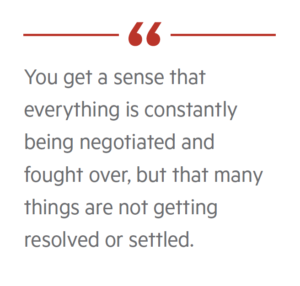 of NGOs played in the National Dialogue. And so you get a sense that everything is constantly being negotiated and fought over, but that many things are not getting resolved or settled.
of NGOs played in the National Dialogue. And so you get a sense that everything is constantly being negotiated and fought over, but that many things are not getting resolved or settled.
What are some of the important issues that are caught in gridlock?
I’d point to two struggles: one over the members of the new Constitutional Court and another over the laws, framework, and schedule for municipal elections.
Without a constitutional court, the democratic transition is not complete. The court, the first of its kind in Tunisia, is mandated by the 2014 Constitution, but it has not yet been formed. The court will have the right to review laws and thus will be in a position, at least in theory, to settle lots of political questions, including differing interpretations of the Constitution. The Constitution represents a negotiated compromise in which secular and Islamist political forces each made painful concessions and obtained significant gains. The result is a document filled with tensions and ambiguities, which the Constitutional Court is meant to help resolve. This has made the battle over appointing the court’s members intense. Appointing members isn’t simply a matter of replacing one or two justices—it’s a question of choosing the entire court, which will help shape Tunisia’s future.
Article 118 of the Constitution states that the court will be an independent judicial body composed of 12 members—four chosen by the President of the Republic, four selected by Parliament, and four chosen by the Supreme Judicial Council (SJC), a judicial oversight body mandated with making judicial appointments and regulating the discipline and career progression of judges.
Creating the SJC was itself a huge political fight that took a good year (the law was finally passed last October). Even since then, as I understand it, the President, Parliament, and the SJC have remained deadlocked over the composition of the Constitutional Court.
What are they deadlocked over?
That’s not obvious. Indeed, I would emphasize “as I understand it.” One of the challenges in Tunisia is getting a clear story, a definitive explanation, on this political issue and many others. The fact of the matter is that Tunisians themselves often are unclear about what decision-makers are doing. But I would attribute this challenge over the Constitutional Court in part to the complex and cumbersome process of appointing the members. I often ask myself who came up with it.
The complexity of such procedures reminds us that Tunisia is a country in which lawyers dominate the political class, which is part of the French colonial legacy and influence. On the positive side, a political class that is largely made up of lawyers can promote the rule of law.
But political leaders often raise legal questions as a way to score points rather than to resolve issues, which of course contributes to gridlock. So the focus on legality often is used as a political weapon—a phenomenon not unique to Tunisia. That said, I would guess that one of the key obstacles holding up the appointment of the Court’s members is the enduring tensions between Islamists and secularists, both of whom have deep stakes in the future of the Court and in how the Constitution is interpreted. Neither group wants the other to prevail in this struggle, and neither has been able to impose its will on the other. So they keep on squabbling. Here again, the absence of a leader or an institution that could play the role of arbiter, pushing all sides to come to an agreement, is widely felt. That said, Tunisia can’t reinvent the National Dialogue to solve every conflict.
Why haven’t municipal elections taken place, two years after the 2014 parliamentary and presidential elections?
Municipal elections are a key component missing from Tunisia’s democratic transition. Elected local governments are essential for strengthening governance and for ensuring that 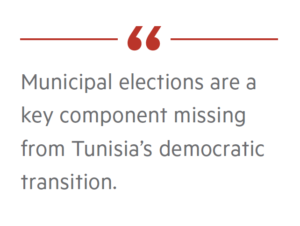 there are real and effective mechanisms to link those who are remote from the political center to local forms of representation and political engagement.
there are real and effective mechanisms to link those who are remote from the political center to local forms of representation and political engagement.
There is a widely-recognized need to devolve power from Tunis to the regions. But the details of how to do so (for example, what political and taxation powers to give to municipalities) raise many questions of power and resources. In addition, there remain logistical challenges, such as how to register new voters and how to delimit municipal electoral boundaries.
Is it that hard to overcome logistical problems in a country like Tunisia, which is relatively small and has already organized several successful democratic votes?
Not necessarily, but I still heard all kinds of stories about institutional and legal challenges to holding municipal elections. My sense is that a good part of this may be exaggeration designed to deflect attention from more essential political and even identity-based concerns.
What do you mean by “identity concerns”?
Having freely elected municipal councils could shift some of the power balance toward Islamists. Most secular, Tunis-focused parties lack the strong local connections and networks that the Islamically-oriented Ennahda Party enjoys in many parts of Tunisia. And many of the secular parties—especially President Beji Caid Essebsi’s Nida Tounes Party, which won the 2014 national elections—are now fractured by personal and ideological divisions. This increases Ennahda’s electoral chances. From Ennahda’s point of view, a delay in elections is acceptable and perhaps even useful: the more time it has to sink local roots and mobilize supporters, the better. As for Nida Tounes and other secular parties, they need more time to prepare for competition. So there has been a kind of de facto understanding between competing political forces that prolonging the launch of municipal elections is desirable.
Didn’t Parliament recently pass some of the legislation for municipal elections?
Yes, finally, and that marks progress of a sort. As I understand it, the last obstacle holding up agreement was a debate over whether the armed forces and police should have the right to vote. Here, as is so often the case in Tunisia, the debate was framed in broad legal principles: is it proper or even constitutionally legitimate to give soldiers and police officers the right to vote? But the more basic political issue, I think, was that Ennahda supporters feared that giving the security forces the right to vote would give non-Islamist parties and candidates an electoral advantage—a reasonable calculation. The decision to enfranchise members of the police and military represents an important compromise, but there are still many legal questions about the elections, including defining the functions and the powers of the municipal councils. These questions will be settled eventually, but in the meantime, Tunisians have no elected local representation. This is especially felt in the disadvantaged interior regions where economic and social grievances are mounting.
Everything you have said so far suggests that despite Tunisia’s achievements in consensus-building and compromise, Islamist- secular divisions remain strong.
Yes, they do, especially within the urban professional class and some elite circles. For many average Tunisians, my sense is that these issues are less pressing than the daily challenges of making a living or 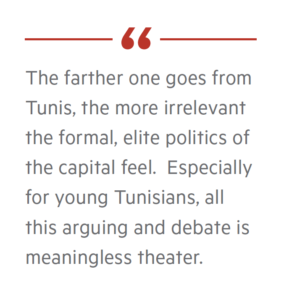 finding a job. And the farther one goes from Tunis, the more irrelevant the formal, elite politics of the capital feel. Especially for young Tunisians, all this arguing and debate is meaningless theater.
finding a job. And the farther one goes from Tunis, the more irrelevant the formal, elite politics of the capital feel. Especially for young Tunisians, all this arguing and debate is meaningless theater.
On this issue of many young people not seeing formal politics as meaningful, are civil society groups helping to bridge the gap?
I have always taken a rather cautious view of the capacity of civil society organizations to address problems that are rooted in political society—the sphere of parliaments and political parties.
Civil society groups proliferated after 2011. And many educated, urban young Tunisians still see civil society as more appealing, more dynamic and deserving of their energy, than the mundane work of organizing through parties and elections. But some of these organizations are elitist in nature, or reproduce the Islamic–secular divide, mirroring wider societal divisions. Thus they cannot always muster the broad social support and leverage needed to push for change. This may help to explain why some Tunisians to whom I spoke felt that civil society mobilization might be diminishing, and why Tunisia’s political leaders don’t always see civil society as a crucial force that merits their attention. Civil society organizations have to force their way into many political debates. In one recent example, Parliament at first shut civil society groups out of the debate over changing Tunisia’s notoriously harsh drug laws, a big issue in a country where thousands of young people are imprisoned for minor drug infractions. Initially, parliamentary leaders argued that hearings for civil society groups to present their ideas would take too much time and told them to submit written remarks instead. After pressure from several organizations, Parliament finally scheduled hearings for this month. But some civil society leaders saw this episode as a sign of growing resistance to listening to their opinions.
Are political struggles and gridlock contributing to Tunisia’s economic crisis?
Yes. The economy seems as bad as ever. The tourism industry remains in a deep slump—my large hotel was nearly empty. Economic growth is still sluggish. The causes of this situation are not easily addressed, but two changes in particular would have a significant impact. First, Tunisia needs an overhaul of its outdated investment laws. Second, Tunisia must enact economic reforms that encourage competition and efficiency. It is hardly surprising, however, that UGTT (Tunisia General Labor Union) leaders are opposed to many of these reforms, such as limiting annual pay increases or opening the door to privatization, because they will likely impose hardships on the union’s mass base. A “National Dialogue on the Economy” could generate some consensus on economic policy. But it is not clear who will arbitrate such a debate. Who will push the participants towards a common plan? The UGTT cannot play the third-party convening role that it did during the 2013 National Dialogue, because it must represent the interests of its own (sizeable) constituencies. And many people to whom I spoke believe that persistent divisions within and between parties would make it hard for Parliament, which in theory could be a venue for consensus-building, to forge a coherent economic reform program. One might think that economic crisis would be a sufficient catalyst to reach consensus over crucial reforms, but apparently it has not been.
Given everything you have said, how long can Tunisia continue without mounting frustration, or a major event—another serious terrorist attack or perhaps violent protests against the government—disrupting the transition?
It seems something of a miracle that things haven’t gotten worse. For example, how long can people put up with the amount of trash currently in the streets—a small matter 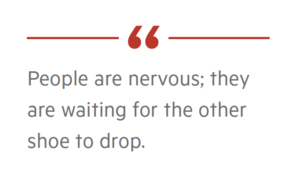 compared to the threat of another terrorist attack, but a problem of weak governance and dysfunctional bureaucracy that you can literally smell. People are nervous; they are waiting for the other shoe to drop. To be sure, there are some political bright spots, such as the ongoing hearings of the Truth and Dignity Commission. Televised for all to watch, the hearings have given victims of human rights abuses under the former authoritarian system an opportunity to tell their harrowing stories, and perpetrators the chance to at least own up to their crimes. These hearings remind people of the cost of autocracy—even as many Tunisians express some nostalgia for the days of “order” under the previous regime. So life goes on, with a sense of wonder that things have not fallen apart. That’s Tunisia.
compared to the threat of another terrorist attack, but a problem of weak governance and dysfunctional bureaucracy that you can literally smell. People are nervous; they are waiting for the other shoe to drop. To be sure, there are some political bright spots, such as the ongoing hearings of the Truth and Dignity Commission. Televised for all to watch, the hearings have given victims of human rights abuses under the former authoritarian system an opportunity to tell their harrowing stories, and perpetrators the chance to at least own up to their crimes. These hearings remind people of the cost of autocracy—even as many Tunisians express some nostalgia for the days of “order” under the previous regime. So life goes on, with a sense of wonder that things have not fallen apart. That’s Tunisia.
Finally, what about the role of the United States?
No one, with the exception of the Islamic State, wants Tunisian democracy to fail. The consequences for Tunisia and for the region would be disastrous. The United States has a key role to play, especially in galvanizing international financial support and investment. The United States and its Western allies also could offer more help on security sector reform. The police are far more visible in the streets of Tunis, and at hotels and other public locations, than they were a few years ago, which is a sign of the Tunisian government’s heightened focus on security in the wake of several terrorist attacks in 2015. But the security sector still needs major reforms. Some Tunisians told me they were disappointed that President Barack Obama had never bothered to visit Tunisia, and that they would appreciate more support from the United States. Now, with the change in Washington, no one is certain what will happen.
That being said, it is up to Tunisians themselves to address the problems that bedevil their country. In 2011, Tunisians rose up and overthrew a political system that was highly centralized and coercive, one that harshly punished any political and economic initiatives not backed by President Ben Ali and his allies in the ruling apparatus. Once the ancien régime was overthrown, Tunisians had to create the space, ethos, and institutions to resolve conflicts democratically, in order to allow Tunisians of quite different political affiliations and social beliefs to live together as equal citizens. Perhaps there are ways in which the United States and other Western democracies can help, such as by expanding programs on conflict resolution and mediation. But however valuable, these are still micro-level efforts. In a country suffering from deep social and identity conflicts, finding lasting solutions through new democratic institutions is not easy.
Daniel Brumberg is a Nonresident Senior Fellow with the Project on Middle East Democracy. Dr. Brumberg is Professor of Government at Georgetown University, where he directs the Master’s Program in Democracy and Governance. Dr. Brumberg is a leading expert on authoritarian resilience and the dynamics of political reform in the Arab world and the wider Islamic world. He also is a noted specialist on Iran. His most recent book, Power and Change in Iran: Politics of Contention and Conciliation, edited with Farideh Farhi, was published in April 2016.


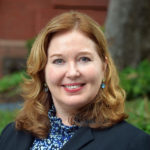
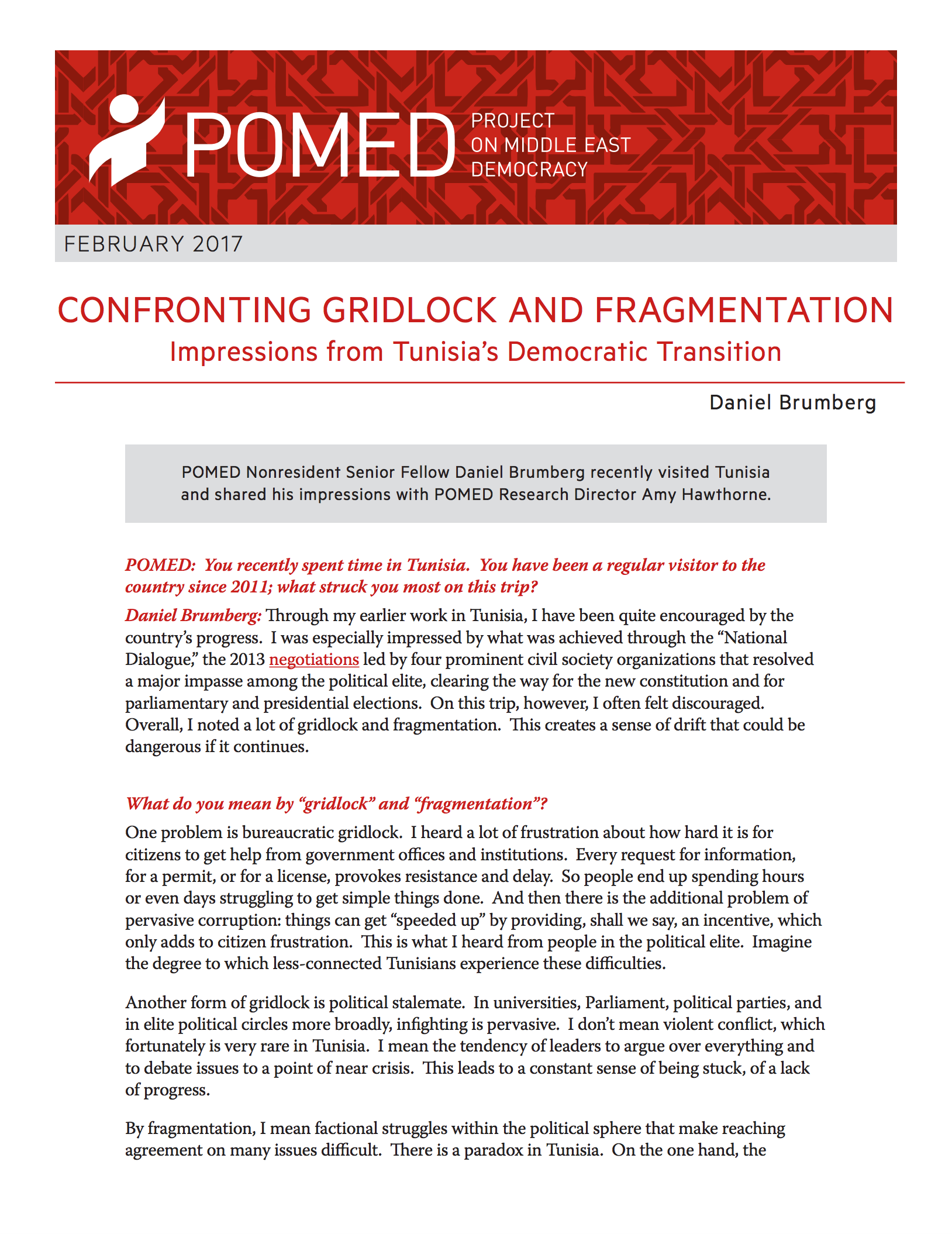


|
Consolidating Power: Tunisian President Kais Saied’s Crackdown on the Judiciary